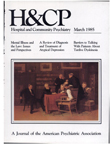Overcoming Resistance to Talking to Patients About Tardive Dyskinesia
Abstract
The American Psychiatric Association's task force report on tardive dyskinesia recommends that when a clinician wishes to prescribe a maintenance regimen of neuroleptic drugs, patients and families be advised of the risks and benefits so that a mutual decision can be made. However, there is significant resistance to talking to patients about tardive dyskinesia. The author reviews institutional, clinician, and patient sources of this resistance and describes ways that obstacles to obtaining informed consent can be overcome. He concludes that with strong institutional support, clinicians functioning as a team can learn to view patient education and involvement in decision-making as an integral part of treatment.
Access content
To read the fulltext, please use one of the options below to sign in or purchase access.- Personal login
- Institutional Login
- Sign in via OpenAthens
- Register for access
-
Please login/register if you wish to pair your device and check access availability.
Not a subscriber?
PsychiatryOnline subscription options offer access to the DSM-5 library, books, journals, CME, and patient resources. This all-in-one virtual library provides psychiatrists and mental health professionals with key resources for diagnosis, treatment, research, and professional development.
Need more help? PsychiatryOnline Customer Service may be reached by emailing [email protected] or by calling 800-368-5777 (in the U.S.) or 703-907-7322 (outside the U.S.).



